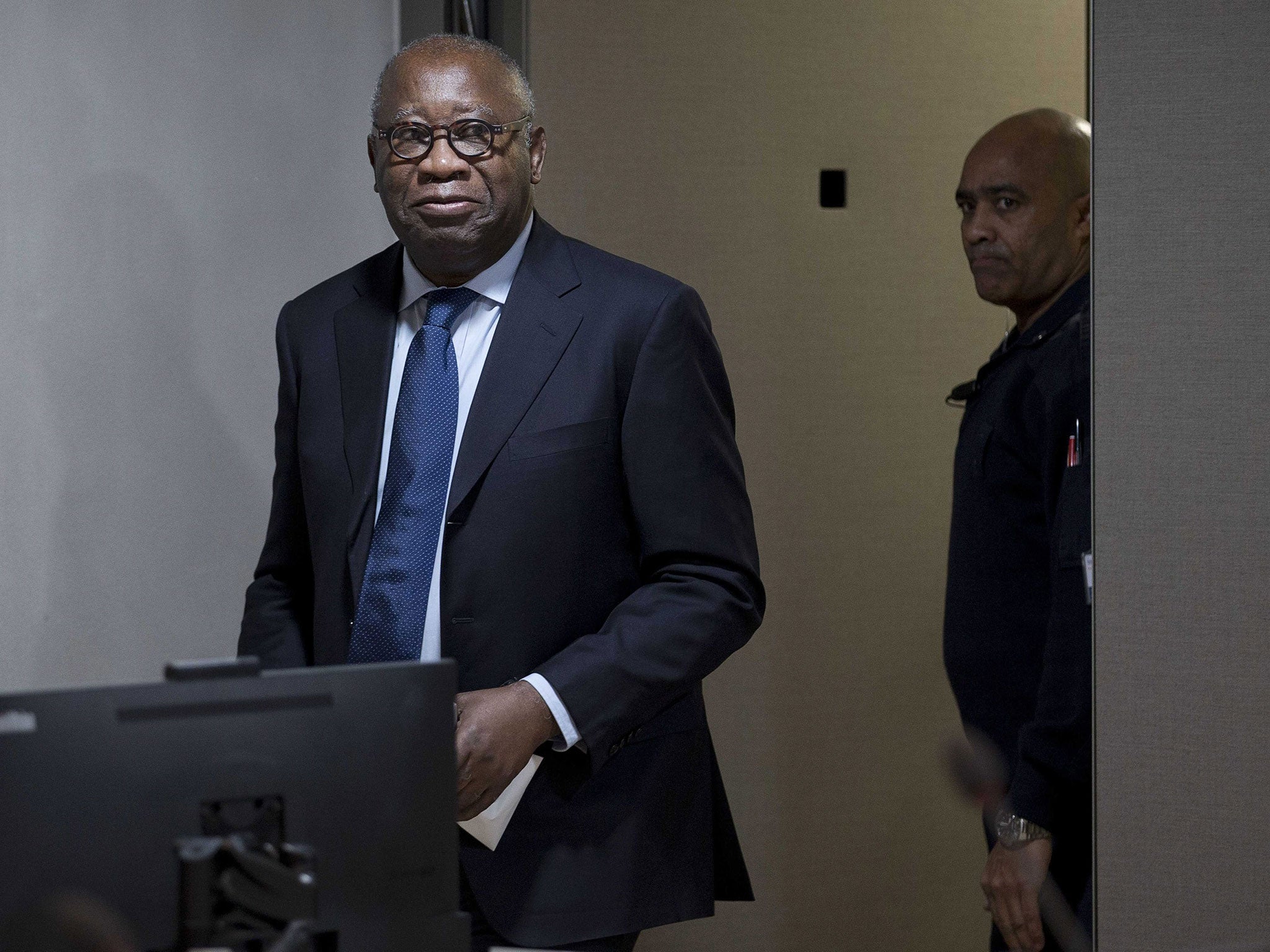Laurent Gbagbo trial: Ivory Coast’s ex-President ‘used rape and murder’ against rivals, ICC told
Mr Gbagbo goes on trial in The Hague accused of using violence to try to cling to power

The former Ivory Coast President Laurent Gbagbo unleashed a wave of murderous violence against supporters of his political opponents in a desperate bid to remain in power after defeat in the 2010 election, the International Criminal Court (ICC) has been told.
The court heard that murder, rape and widespread persecution by Ivorian security forces and supporters loyal to Mr Gbagbo followed in five months of bloody clashes between him and those for President Alassane Ouattara, which left as many as 3,000 dead and thousands more wounded.
“Nothing would be allowed to defeat Mr Gbagbo. If politics failed, violence was seen as politics by other means,” prosecutor Fatou Bensouda told the three ICC judges sitting in The Hague in the Netherlands.
This is the first trial of a former head of state by the ICC, which is facing widespread criticism for the way it has tried to hold the powerful leaders of African nations to account for crimes.
Mr Gbagbo, 70 and Charles Ble Goude, 44, a former minister in his administration, deny charges of inciting atrocities after the presidential run-off in the West African nation.
A crowd of several hundred demonstrators protested outside the court, denouncing the trial as “victor’s justice”. The trial is expected to last several months.
A total of 138 witnesses including victims of violence and members of Mr Gbagbo’s inner circle would testify about the men’s involvement in plotting the post-election violence even before the 2010 vote, Ms Bensouda said.
One witness, a woman arrested by police after attending a peaceful pro-Ouattara political rally, was repeatedly gang-raped at police headquarters over a three-day period, Ms Bensouda said.
“The purpose of this trial is not to determine who won the elections or who was to win the elections. The purpose of this trial is establish individual responsibility of the two accused of the crimes committed,” she added.
The court heard that Mr Gbagbo, a former university professor who spent many years living in exile in France, won the first round of the 2010 presidential vote with 38 per cent. However, he lost in the run-off against his rival Alassane Ouattara.
In December 2010, Mr Gbagbo refused to step down when the Independent Electoral Commission and international observers proclaimed his rival, Mr Ouattara, the winner of the run-off.
In the resulting five months of violence and armed conflict, at least 3,000 people were killed and more than 150 women raped, with military forces on both sides targeting civilians according to their political, ethnic and religious affiliations.
As defeat loomed, prosecutors say the defendants marshalled security forces, youth militias and mercenaries to attack groups perceived as opposition supporters.
Mr Ble Goude, as leader of the pro-Gbagbo militia called the Young Patriots, was a key member of Mr Gbagbo’s inner circle. Ms Bensouda described him in court as a “self-proclaimed general of the streets” who “manipulated the youth with hateful rhetoric”.
Security force units closely linked to Mr Gbagbo are accused of abducting rival political leaders. In some cases they were dragged publicly from restaurants or from their homes. Their bodies were later discovered in morgues from gunshot wounds. Pro-Gbagbo militias who set up impromptu checkpoints are accused of murdering scores of rival supporters.
The ICC has yet to bring any charges against those who supported President Ouattara and who have been accused of similar atrocities.
Mr Gbago’s son Michael told the BBC that he expected the truth to be heard and his father freed. He questioned the ICC’s impartiality. “It’s not a question of innocence – my question is about the credibility of this kind of justice because one side is persecuted. We’re not sure this high court is very credible and can deliver justice, real justice,” he said. Ms Bensouda has pledged to bring both sides to justice. “This is our first case to reach trial,” linked to Ivory Coast crimes, Ms Bensouda said. “There will be others.”
The trial continues.
Join our commenting forum
Join thought-provoking conversations, follow other Independent readers and see their replies
Comments
Bookmark popover
Removed from bookmarks